Macau – A Tale of Two Cities Posted by sasha on Nov 23, 2015 in Culture
We recently introduced the Special Administrative Region of Macau, dubbed the “Vegas of the Orient” for its abundance of casinos that bring busloads of mainland tourists in every day to try their luck at the only place with legal gambling in China. Although Macau is best-known for these massive casinos, there’s a whole other side to this city showcasing its history as a former Portuguese colony. Due to its status as an SAR, Macau is an obvious choice for those needing to make a visa run from the mainland. If you’re on a multiple entry visa for China, simply stepping over into Macau gives you the ability to turn right back around and get a fresh stay on the mainland. Here are some photos and observations from one such visa run I recently made to Macau:
Historic Center
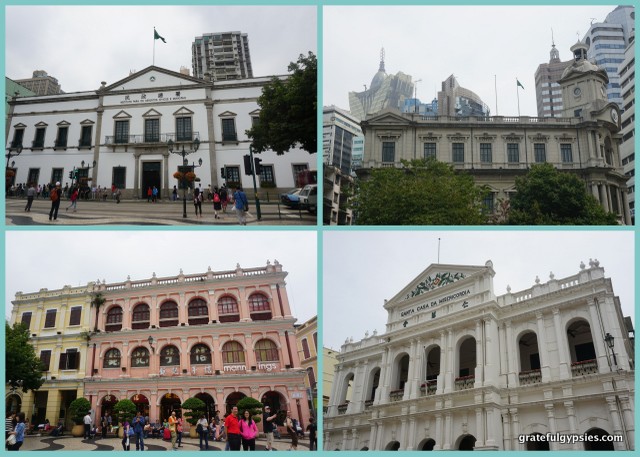
Visit the Historical Center of Macau.
The Historic Center of Macau (澳门历史城区 – Ào mén lì shǐ chéng qū) is a UNESCO World Heritage area comprised of 20+ sites showing the co-existence of Chinese and Portuguese cultures here. Not a huge fan of gambling, I opted to base myself in this area for my short stay. Plus, as a part-time English teacher/blogger, staying in one of the casinos was totally beyond my meager budget. Just a stone’s throw from the main square, you’ll find the Sanva Hotel. This is the closest to a hostel you’ll get in Macau, and with rooms ranging from $25-45 it’s also probably the cheapest place in town. It’s nothing special, but it worked just fine as a home-base for exploring the area.
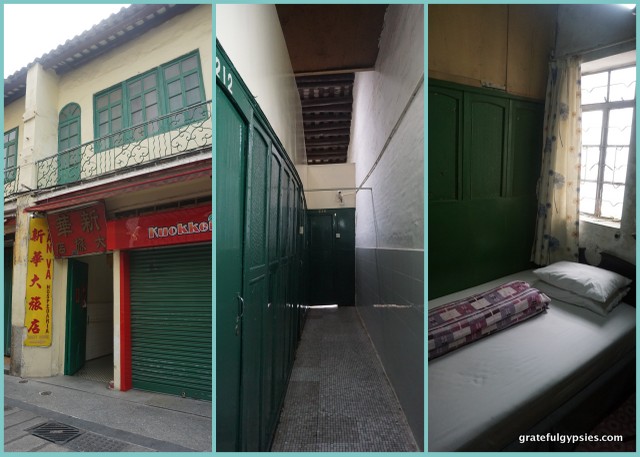
Budget digs in Macau.
First up, I checked out two religious sites that clearly show the cultural mix of Macau – the Kuan Tai Temple and St. Dominic’s Church. During colonial times, Macau became a center of Christianity in East Asia, but the only remaining vestige of those times are the beautiful churches. These days, most people in Macau follow Buddhism or Chinese folk religions.
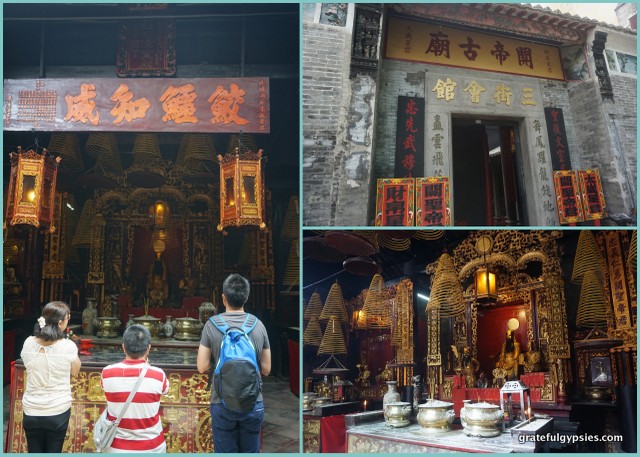
Kuan Tai Temple
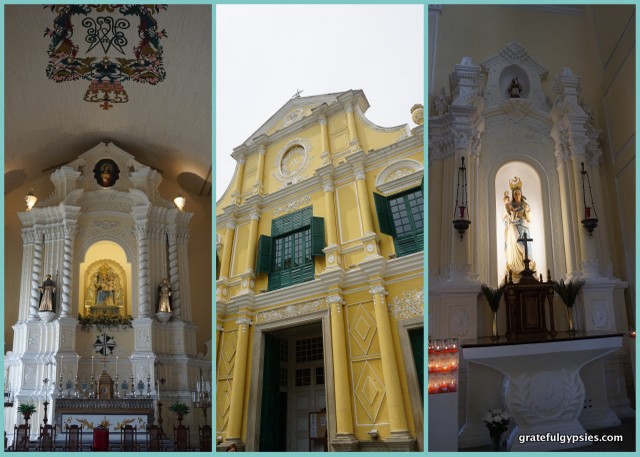
St. Dominic’s Church
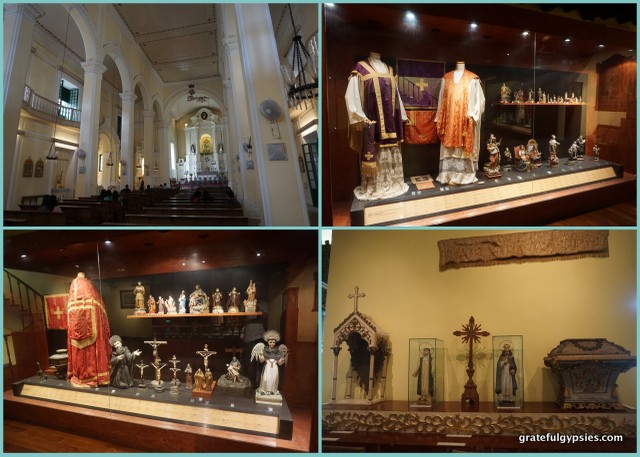
More shots from St. Dominic’s.
Perhaps the most famous landmark of historic Macau are the Ruins of St. Paul’s, a 16th-century complex that was formerly a church and college. All that remains is the façade, which is the most photographed place in the city. Get your selfie stick ready and join the crowd.
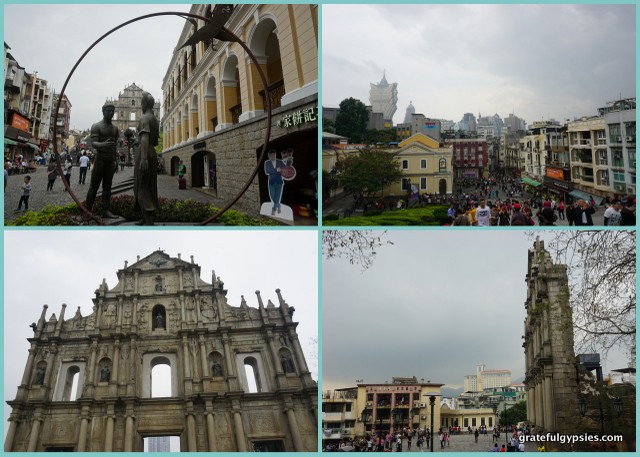
Ruins of St. Paul’s
A short walk up the hill will take you to Fortaleza do Monte (Mount Fort). Originally constructed to defend from pirates, today it is home to the Museum of Macau where you can learn about the culture and history of the city. From the fort, you can enjoy one of the best (and free) views of the city, which is the most densely populated place on Earth.
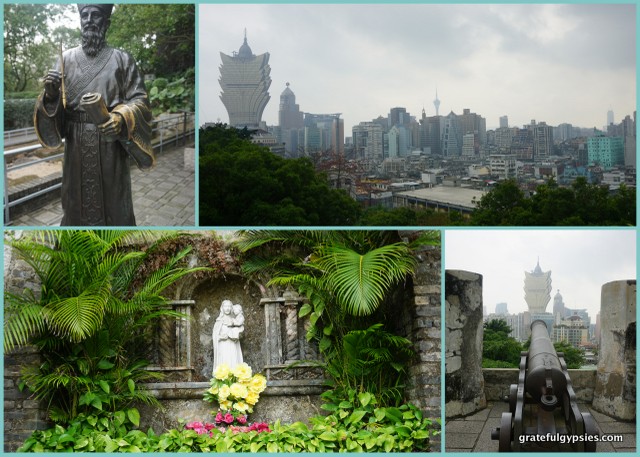
Mount Fort
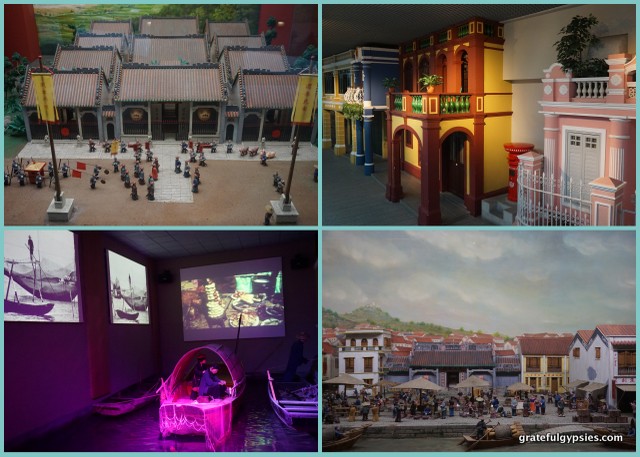
Museum of Macau
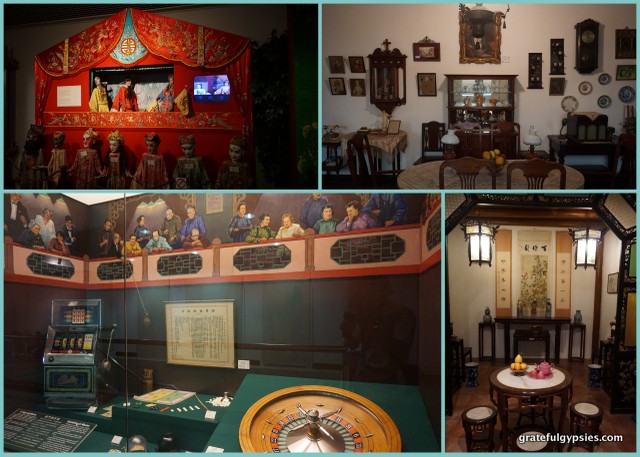
Museum of Macau
Strolling the streets in the historic center, you’ll find countless vendors selling some of Macau’s most famous snacks – the pork chop bun and Portuguese egg tart. There’s also tons of delicious jerky for sale, which makes a great gift or souvenir if you can manage not to eat it all.
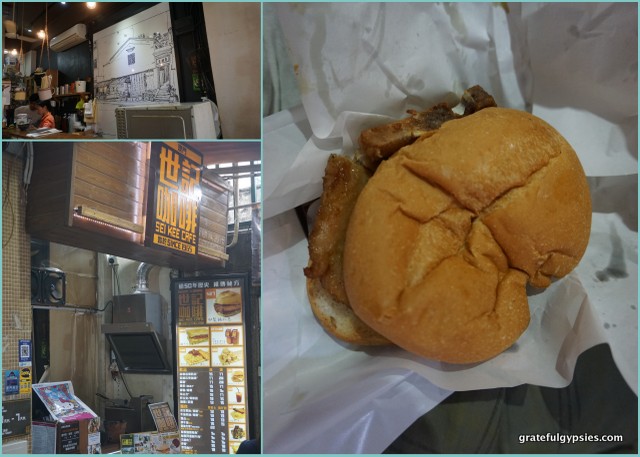
Mmmm… pork chop bun.
I love aimlessly wandering when I visit new cities, and doing so in Macau landed me in the peaceful Lou Lim Ioc Gardens, which were originally built as part of a local merchant’s residence and are now a popular public park. The nearby Tap Seac Square is surrounded by historic buildings and makes for an interesting place to take a few photos.
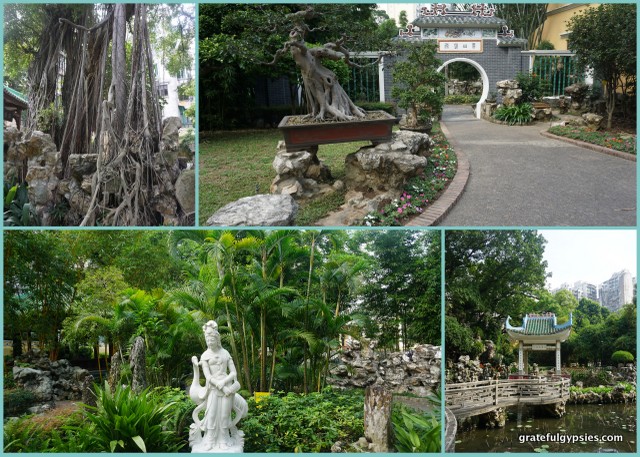
Hang in the garden for a while.
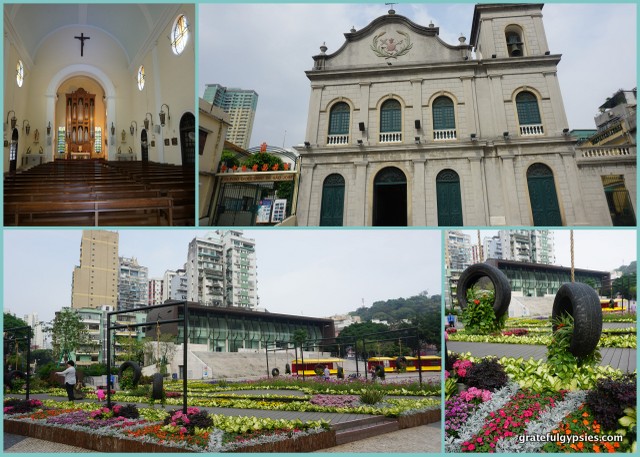
Another church and a funky local square.
Ready to make the transition from historic to modern Macau, I strolled through the San Francisco Gardens and past the lovely pink and white Clube Militar de Macau, once a private military club and now one of the city’s fanciest restaurants.
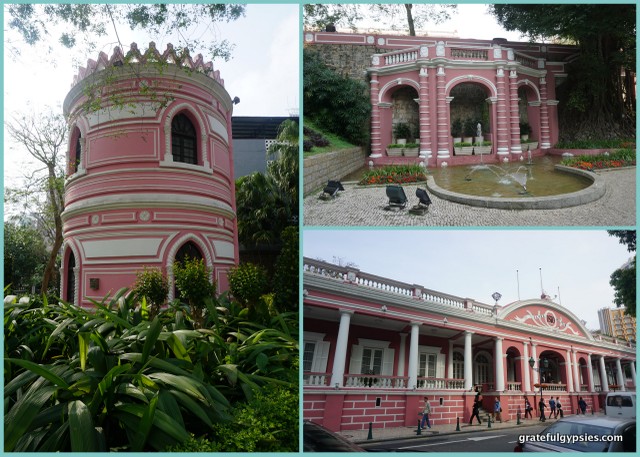
San Francisco Garden and Clube Militar de Macau.
While the churches, gardens, and old monuments are fascinating, let’s be honest – most tourists these days come to Macau for the casinos. Gambling tourism accounts for nearly half of the city’s economy, although revenues have been dropping with the lag in the Chinese economy and the crackdown on corruption.
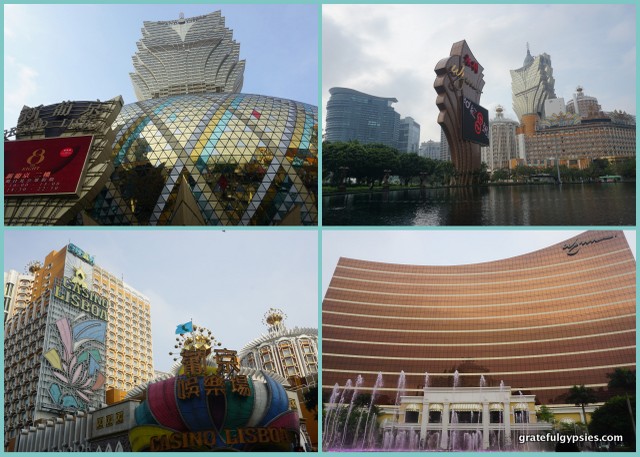
Feelin’ lucky?
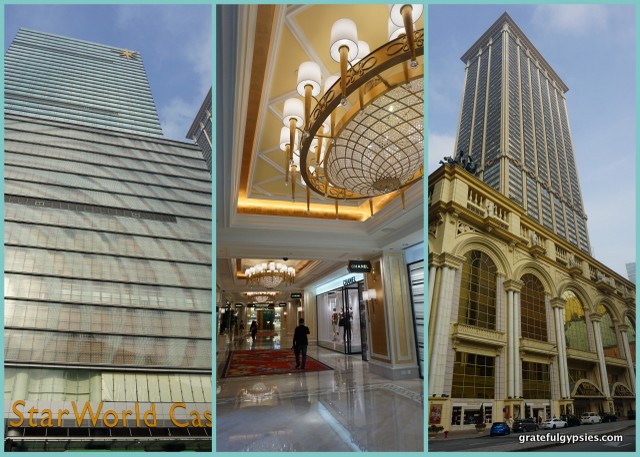
A few of the massive casinos.
With the sun down, the skyline of new Macau becomes illuminated in a sea of flashing neon lights. On my walk back to the hotel, I snapped a great picture showing the stark contrast between old and new in Macau – the massive Grand Lisboa casino towering over an old, crumbling apartment building.
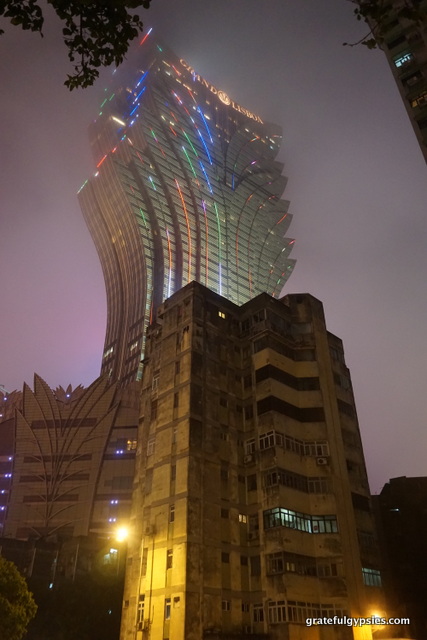
Old vs. New
Having worked up quite the appetite, I hoped to dine on some Portuguese fare. Unfortunately, the only place with such a menu in my area was already closing down for the night. I guess it’s better to have an early dinner in the historic part of town. It worked out, though, as I found a cheap and tasty plate of Cantonese pork.
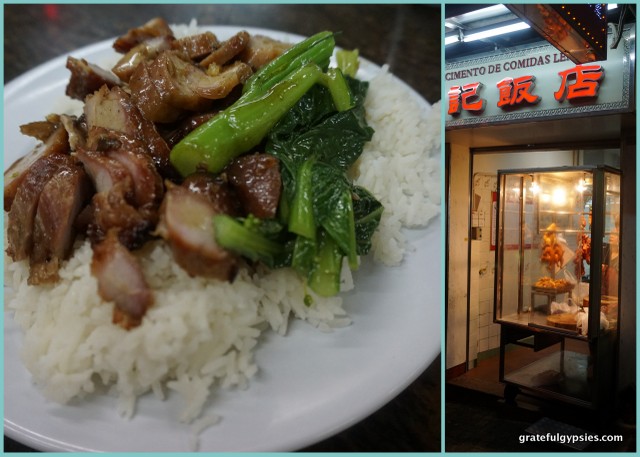
Tasty Cantonese dinner.
With tired feet and a full belly, I resisted the urge to go lay down in favor of seeing the city at night for a bit. Another stroll through the main square was a bit more pleasant in the cooler nighttime air.
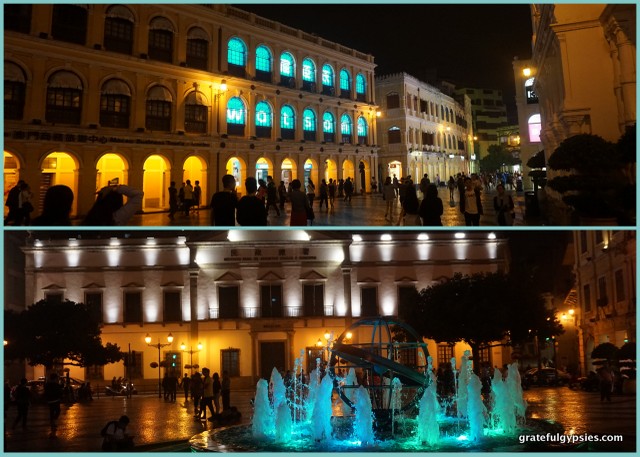
The main square at night.
Although I’m not a huge fan of casinos – I always lose whatever money I bring in – I decided to go back and at least grab a drink or two while playing some slots. Much to my chagrin, I found that casinos in Macau apparently only serve green tea. Seriously, who goes to a casino and drinks green tea? Disappointed, I bought a few beers in the street and enjoyed them on my walk home. Macau may pull in more gambling revenue than Vegas, but the original sure comes out on top when it comes to nightlife options.
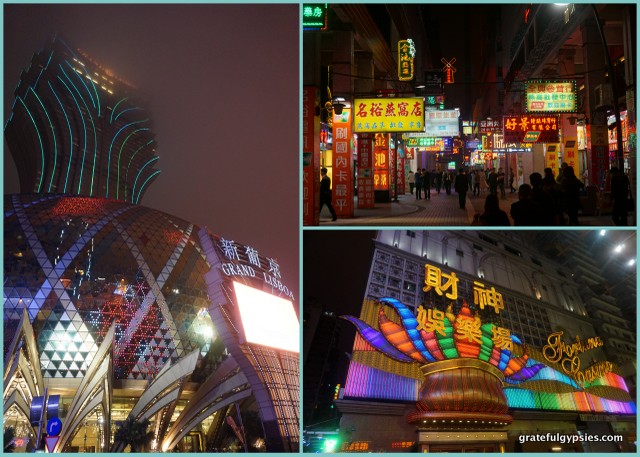
Bright lights, big city.
Before crossing back over to the mainland the next day, I went out for one more walk to have some egg tarts and check out a few more of the historic buildings – the Dom Pedro Theater and St. Augustine’s Church.
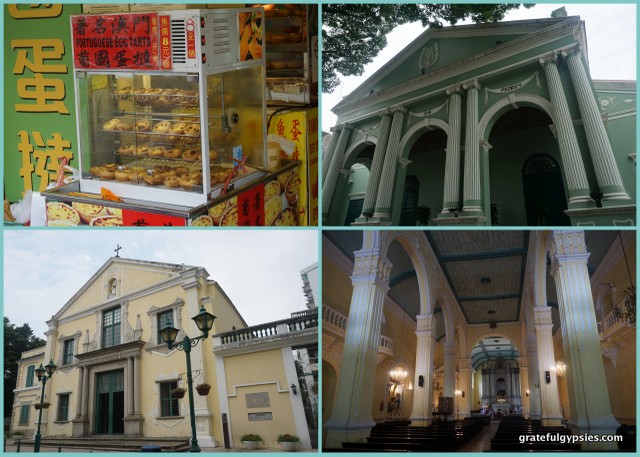
More historic buildings and egg tarts.
In the end, I didn’t win any money in Macau, but I didn’t lose any either. If gambling while drinking green tea is your thing, then head to the casinos and try your luck. If not, Macau is still well worth a visit. Exploring the historic center, snacking on the delectable Portuguese treats, and taking photos of the lovely colonial architecture makes for an awesome one or two day trip, and is a nice break from the usual border-hop over to Hong Kong if you’re making one of those dreaded visa runs.

Build vocabulary, practice pronunciation, and more with Transparent Language Online. Available anytime, anywhere, on any device.
About the Author: sasha
Sasha is an English teacher, writer, photographer, and videographer from the great state of Michigan. Upon graduating from Michigan State University, he moved to China and spent 5+ years living, working, studying, and traveling there. He also studied Indonesian Language & Culture in Bali for a year. He and his wife run the travel blog Grateful Gypsies, and they're currently trying the digital nomad lifestyle across Latin America.




Leave a comment: